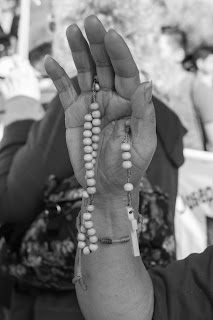With continued talk of building a wall along our border with
Mexico, we need to continue to oppose such efforts. It is easy to get
disheartened at times, but we need to remember in this Easter season, we are
people of hope. We proceed with joyful, hopeful and faithful hearts. These are
the common attributes shared by the women in the book “The Women of Easter:
Encounter the Savior with Mary of Bethany, Mary of Nazareth, and Mary
Magdalene,” by Liz Curtis Higgs.
In April, some fellow poets and I visited the border wall
near the Old Hidalgo Pumphouse in Hidalgo. As we walked the edges and went
around the wall to explore the old trails overgrown now from disuse, I wondered
how many more nature trails would be cut from our reach, and how unwelcoming
and threatening our borders are becoming. As we read our poems to give others a
glimpse of our Rio Grande Valley, we found comfort in knowing our words can
impact the world.
Our actions, too, are important.
Bishop Daniel E. Flores in a lecture titled “The Politics of
Human Dignity, Catholics and Immigration” which he presented at Bellarmine
University in Louisville, Kentucky, said, “A Catholic must begin with hope
which for us can only emerge from our contemplation of the One who watches in
the night. For us politics can only really be about keeping faith with Him, and
what he shows us about God, about ourselves and about our neighbor.”
Holy Week leading up to Easter left us also with some
lessons we should remember throughout the year. Each of the Triduum celebrations had a common theme of
coming together and of accompanying Christ on his way to Calvary.
On Holy Thursday, “The Lord washes the feet of his
disciples, and he says at the end of it, ‘As I have done for you, so you must
do for one another.’” Bishop Flores reminded us the Lord “wants us to wash each
other’s feet in humility and in service.”
On Good Friday, as we accompanied Christ on the Via
Dolorosa, we reflected on his humility and suffering. Bishop Flores pointed out in his homily on Good Friday, we
need to recognize the humility of the cross and the hope it offers. “Only a
people humble of heart really understand what the hope of the cross is.” He
also said we need to seek God’s grace. “We need to seek, we need strength, we
need love and we need the courage to be true.”
At the Easter Vigil Mass, we witnessed the power the Lord
has over death, and that he is with us at all times. He is the light. “The
risen one opens the eyes of the blind to what really matters.” It is up to us
to share this news.
Daily we walk together, following Christ’s example, and the
example of his Blessed Mother Mary.
Bishop Flores, in his lecture, said we can sometimes forget that “God’s governance in history expresses itself primarily through human agency.” He shared the story of his grandmother who “prayed that if ever they (her grandchildren) are in trouble, God would put a kind and generous soul in their path to help them.” “She was a woman of faith, and trusted to God that He would find ways to help them. Mostly, that meant He would put the right people in their path,” he said.
Bishop Flores, in his lecture, said we can sometimes forget that “God’s governance in history expresses itself primarily through human agency.” He shared the story of his grandmother who “prayed that if ever they (her grandchildren) are in trouble, God would put a kind and generous soul in their path to help them.” “She was a woman of faith, and trusted to God that He would find ways to help them. Mostly, that meant He would put the right people in their path,” he said.
 Bishop adds, “The mirror image of that kind of perception,
available to anyone with faith and a little imagination, is that we are also
all potentially answers to some grandmother’s prayer in some place far away.
Indeed, the generosity God inspires in each one of us today is his answer to
someone’s prayer.”
Bishop adds, “The mirror image of that kind of perception,
available to anyone with faith and a little imagination, is that we are also
all potentially answers to some grandmother’s prayer in some place far away.
Indeed, the generosity God inspires in each one of us today is his answer to
someone’s prayer.”
These words resonate. They imbue us too with responsibility
as we consider how we can be the “answer to someone’s prayer.” I encourage you take some time to read the bishop’s entire
lecture, which is posted on his blog.
“Even in a wounded world,” he notes, “people find themselves
crossing paths with someone who will not abandon them to disaster.”
While some may insist on building walls, we must continue to
be God’s hands and feet in the world, offering care to those who need it. We
must move forward as joyful men and women of Easter carrying hope into the
world.
(Originally
published in May 2017 edition of The Valley Catholic newspaper)





